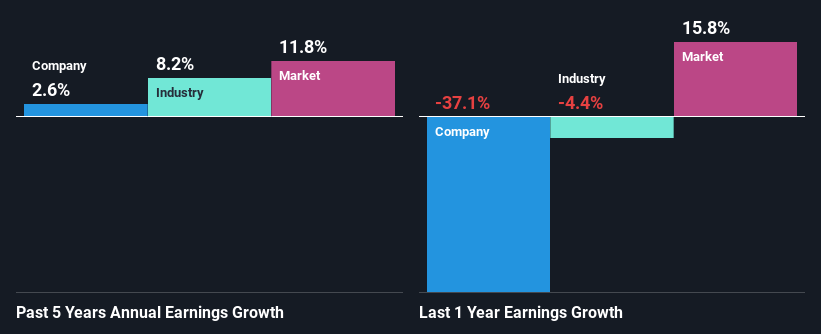Ennis, Inc.'s (NYSE:EBF) Stock Going Strong But Fundamentals Look Weak: What Implications Could This Have On The Stock?
Ennis (NYSE:EBF) has had a great run on the share market with its stock up by a significant 11% over the last three months. However, we decided to pay close attention to its weak financials as we are doubtful that the current momentum will keep up, given the scenario. In this article, we decided to focus on Ennis' ROE.
Return on Equity or ROE is a test of how effectively a company is growing its value and managing investors’ money. In other words, it is a profitability ratio which measures the rate of return on the capital provided by the company's shareholders.
View our latest analysis for Ennis
How Is ROE Calculated?
The formula for ROE is:
Return on Equity = Net Profit (from continuing operations) ÷ Shareholders' Equity
So, based on the above formula, the ROE for Ennis is:
8.0% = US$24m ÷ US$301m (Based on the trailing twelve months to February 2021).
The 'return' is the yearly profit. So, this means that for every $1 of its shareholder's investments, the company generates a profit of $0.08.
What Has ROE Got To Do With Earnings Growth?
Thus far, we have learned that ROE measures how efficiently a company is generating its profits. Based on how much of its profits the company chooses to reinvest or "retain", we are then able to evaluate a company's future ability to generate profits. Generally speaking, other things being equal, firms with a high return on equity and profit retention, have a higher growth rate than firms that don’t share these attributes.
A Side By Side comparison of Ennis' Earnings Growth And 8.0% ROE
When you first look at it, Ennis' ROE doesn't look that attractive. Yet, a closer study shows that the company's ROE is similar to the industry average of 6.7%. Having said that, Ennis has shown a meagre net income growth of 2.6% over the past five years. Remember, the company's ROE is not particularly great to begin with. So this could also be one of the reasons behind the company's low growth in earnings.
We then compared Ennis' net income growth with the industry and found that the company's growth figure is lower than the average industry growth rate of 8.2% in the same period, which is a bit concerning.
The basis for attaching value to a company is, to a great extent, tied to its earnings growth. It’s important for an investor to know whether the market has priced in the company's expected earnings growth (or decline). By doing so, they will have an idea if the stock is headed into clear blue waters or if swampy waters await. If you're wondering about Ennis''s valuation, check out this gauge of its price-to-earnings ratio, as compared to its industry.
Is Ennis Making Efficient Use Of Its Profits?
The high three-year median payout ratio of 62% (that is, the company retains only 38% of its income) over the past three years for Ennis suggests that the company's earnings growth was lower as a result of paying out a majority of its earnings.
In addition, Ennis has been paying dividends over a period of at least ten years suggesting that keeping up dividend payments is way more important to the management even if it comes at the cost of business growth.
Conclusion
Overall, we would be extremely cautious before making any decision on Ennis. The company has seen a lack of earnings growth as a result of retaining very little profits and whatever little it does retain, is being reinvested at a very low rate of return. In brief, we think the company is risky and investors should think twice before making any final judgement on this company. To know the 1 risk we have identified for Ennis visit our risks dashboard for free.
This article by Simply Wall St is general in nature. It does not constitute a recommendation to buy or sell any stock, and does not take account of your objectives, or your financial situation. We aim to bring you long-term focused analysis driven by fundamental data. Note that our analysis may not factor in the latest price-sensitive company announcements or qualitative material. Simply Wall St has no position in any stocks mentioned.
Have feedback on this article? Concerned about the content? Get in touch with us directly. Alternatively, email editorial-team (at) simplywallst.com.


